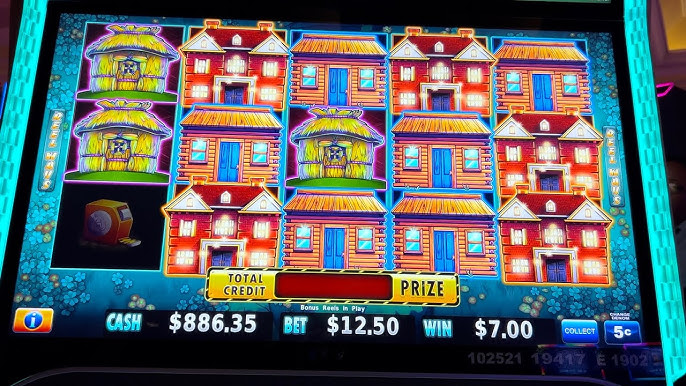Slot games, often referred to as “one-armed bandits,” are one of the most popular and easily recognizable types of gambling games, both in land-based casinos and online gaming platforms. Known for their simplicity and potential for big wins, pol88 slot games attract millions of players worldwide every day. But what exactly are slot games, and why have they become a central pillar of the gambling industry?
The Origins of Slot Games
The origins of slot games date back to the late 19th century. The first mechanical slot machine, known as “Liberty Bell,” was created by Charles Fey in 1895 in San Francisco, California. This early machine had three reels and five symbols, including a Liberty Bell, horseshoes, and diamonds. The machine’s design was straightforward: players would insert a coin, pull the lever, and hope to match symbols across the reels to win a payout.
Over time, slot machines evolved. Mechanical systems gave way to electrical components in the 1960s, and eventually, digital technology revolutionized the way slot games were played. Today, modern slots often feature sophisticated graphics, elaborate sound effects, and various bonus features that enhance the gaming experience.
How Slot Games Work
Slot machines operate on a simple premise: spin the reels and try to match symbols across predetermined pay lines. In the classic mechanical machines, players pulled a lever (hence the term “one-armed bandit”) to start the game, while digital machines now use buttons or touchscreen interfaces.
The most important component of any slot game is the Random Number Generator (RNG). This software algorithm ensures that each spin is independent and that the outcomes are random, meaning no two spins are ever the same. This randomness guarantees fairness and eliminates the possibility of cheating.
Slots typically feature a variety of symbols, and the payout structure varies depending on the game’s theme, design, and specific pay lines. Some common symbols include fruits, numbers, and special icons like wilds or scatters, which trigger bonus features such as free spins or multipliers.
Types of Slot Games
There are various types of slot games that cater to different preferences. Some of the most common types include:
-
Classic Slots: These are traditional slot machines that feature three reels and simple gameplay. They typically have fewer pay lines, and the symbols often reflect the early days of slot machines, such as cherries, bells, and sevens.
-
Video Slots: Video slots are more advanced and often have five reels and multiple pay lines. They come with various bonus features like free spins, wild symbols, and mini-games. The graphics and animations are much more sophisticated, with themes ranging from adventure and mythology to movies and TV shows.
-
Progressive Slots: Progressive slots offer the chance to win massive jackpots that increase every time a player spins the reels. A portion of each player’s wager contributes to the jackpot pool, which continues to grow until someone hits the winning combination. These jackpots can reach millions of dollars, making progressive slots particularly exciting for high-risk players.
-
3D Slots: These slots take the gaming experience a step further by utilizing 3D graphics and cinematic effects to immerse players in a more visually stunning and engaging environment. The graphics can include intricate animations, immersive soundtracks, and interactive bonus rounds.
-
Branded Slots: Branded slots are games that are based on popular movies, TV shows, celebrities, or even music bands. They often come with familiar themes, characters, and music from the source material, making them appealing to fans of those brands.
The Appeal of Slot Games
One of the main reasons for the popularity of slot games is their simplicity. Unlike table games like blackjack or poker, which require strategy and skill, slots are easy to understand. Players don’t need to learn complex rules or make decisions; all they need to do is spin the reels and hope for a winning combination.
Slot games also offer the potential for large payouts, especially in the case of progressive jackpots. The chance to win big with a relatively small wager is a major draw, making slots particularly attractive to both casual players and those looking for high-stakes thrills.
Additionally, slot games are highly accessible. They can be found in virtually every casino, and with the rise of online gambling, players can enjoy slots from the comfort of their own homes. Online slot games are available in a variety of formats, including mobile apps, making it easy for players to enjoy the games on the go.
Responsible Gambling and Slot Games
While slot games can be incredibly entertaining, it’s essential to approach them with a sense of responsibility. The random nature of slots means that the outcome is always uncertain, and while winning is possible, it’s just as likely to lose. Many casinos and online platforms encourage responsible gambling by offering tools like deposit limits, self-exclusion programs, and links to gambling support organizations.
It’s crucial to remember that slot games are games of chance, and no strategy can guarantee a win. Players should always gamble within their means and recognize when it’s time to stop playing.
The Future of Slot Games
The future of slot games looks bright, with technology continually pushing the boundaries of what’s possible. Virtual reality (VR) and augmented reality (AR) are expected to play a major role in the future of slot gaming, offering immersive experiences that could take players to entirely new worlds. Additionally, innovations in artificial intelligence (AI) may result in more personalized gaming experiences, with dynamic bonuses and gameplay elements tailored to individual players.
Slot games will continue to evolve, offering new themes, features, and ways to win. As long as casinos continue to innovate and improve the gaming experience, slot games will remain a central part of the gambling world.
